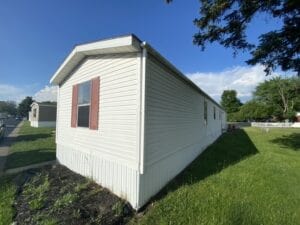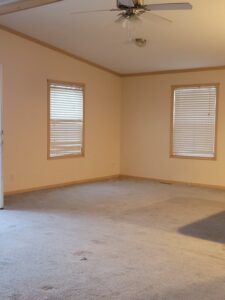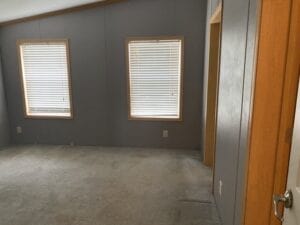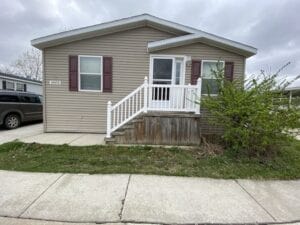If you live in a mobile home, you know how important it is to have a quiet and peaceful environment. However, mobile homes can be quite noisy, especially if you live in a busy area or near a highway. Fortunately, there are several ways to soundproof your mobile home and create a more comfortable living space. In this article How to Soundproof a Mobile Home we will discuss cheap and advanced options to soundproofing your mobile home.

How to Soundproof a Mobile Home
One of the most effective ways to soundproof your mobile home is to add insulation to the walls and ceiling. This will help to reduce the amount of noise that enters your home and make it more energy-efficient. You can also add soundproof curtains or blinds to your windows to further reduce noise levels. Additionally, installing weatherstripping around doors and windows can help to create a tighter seal and prevent noise from entering your home.
Read our article Insulation Under a Mobile Home for more details on why insulation under your mobile home is also important.
Noisy Neighbors in Mobile Home Park
Living in a mobile home park can be a great way to enjoy affordable housing and a sense of community. However, it can also mean dealing with noisy neighbors. Whether it’s loud music, barking dogs, or late-night parties, noise disturbances can be a major source of frustration and stress.
If you’re dealing with noisy neighbors in your mobile home park, there are a few steps you can take to address the issue:
Consider sound proofing your mobile home. If you live in a mobile home park this might be your easiest option. You have many neighbors and there is a lot of traffic in mobile home parks. It typically isn’t just one neighbor causing the issue. However if it is one neighbor, here are some further steps to take.
- Talk to your neighbor: The first step in addressing a noise issue is to talk to your neighbor directly. Be polite and respectful, and try to find a solution that works for both of you. They may not even realize that they’re being too loud, so giving them a chance to fix the problem can be a good first step.
Contact the park manager: If talking to your neighbor doesn’t work, the next step is to contact the park manager. They may be able to mediate the situation or take action if the noise is a violation of park rules.
Keep Track of the Issues of Loud Noise
Keep a record: If the noise issue continues, it’s important to keep a record of when and how often the noise occurs. This can be helpful if you need to escalate the issue to a higher authority.
Consider legal action: In extreme cases, you may need to consider legal action to address the noise issue. This could include filing a complaint with local authorities or seeking a restraining order.
Dealing with noisy neighbors can be frustrating, but it’s important to address the issue in a calm and respectful manner. By taking steps to address the problem, you can create a more peaceful and enjoyable living environment in your mobile home park.
Are you interested in selling your mobile home. Visit our article I Regret Buying a Mobile Home.
Why Soundproofing Your Mobile Home Is Important
If you live in a mobile home, you’re probably aware of the fact that it can be quite noisy. The thin walls and lack of insulation can make it difficult to enjoy peace and quiet, especially if you live in a noisy neighborhood or near a busy road. That’s why soundproofing your mobile home is so important.
Here are a few reasons why soundproofing your mobile home should be a priority:
Improved sleep: If you’re a light sleeper, the noise from outside can be a real problem. Soundproofing your mobile home can help you get a better night’s sleep by reducing the amount of noise that enters your home.
Reduced stress: Constant noise can be stressful, especially if you’re trying to relax or concentrate. By soundproofing your mobile home, you can create a more peaceful environment that’s conducive to relaxation and concentration.
Increased privacy: Thin walls can make it difficult to have private conversations or activities in your mobile home. Soundproofing can help increase privacy by reducing the amount of noise that can be heard from outside.
Improved energy efficiency: Soundproofing can also help improve the energy efficiency of your mobile home by reducing the amount of air that leaks in and out of your home. This can help you save money on your energy bills and make your home more comfortable.
Overall, soundproofing your mobile home is an investment that can pay off in many ways. Whether you’re looking to get a better night’s sleep, reduce stress, increase privacy, or improve energy efficiency, soundproofing is a smart choice.

What You Can Use to Soundproof
When it comes to soundproofing a mobile home, there are several materials and techniques you can use to reduce noise transmission. Here are some options to consider:
Insulation
Adding insulation to the walls, ceiling, and floors of your mobile home can help absorb sound and reduce noise transmission. Fiberglass batts, blown-in cellulose, and spray foam are all effective insulation materials.
Mass-Loaded Vinyl
Mass-loaded vinyl (MLV) is a heavy, flexible material that can be installed on walls, floors, and ceilings to reduce noise. It’s made of a combination of vinyl and other materials, such as barium sulfate, which helps to absorb sound. MLV is easy to install and can be cut to fit any space.
How to Soundproof a Wall
Acoustic Panels
Acoustic panels are designed to absorb sound and reduce echo in a room. They are made of materials such as foam, fiberglass, or rockwool, and can be installed on walls, ceilings, or floors. Acoustic panels come in a variety of shapes, sizes, and colors, so you can choose the ones that best suit your decor. Check out these great acoustic panels available now and shipped directly to your doorstep.
Green Glue
Green Glue is a soundproofing compound that can be applied between layers of drywall or plywood to reduce noise transmission. It’s made of a viscoelastic polymer that converts sound energy into heat, which is then dissipated. Green Glue is easy to apply and can be used in conjunction with other soundproofing materials.
How to Soundproof a Door
Weatherstripping
Sealing gaps and cracks around doors and windows with weatherstripping can help reduce noise transmission. Weatherstripping is made of materials such as foam, rubber, or silicone, and can be easily installed with adhesive backing.
By using a combination of these materials and techniques, you can significantly reduce noise transmission in your mobile home and enjoy a quieter living space.

How to Soundproof a Mobile Home and the Costs
Soundproofing a mobile home can be an effective way to reduce noise levels and create a more comfortable living environment. However, the cost of soundproofing can vary widely depending on the materials and methods used. Here are some factors that can affect the cost of soundproofing your mobile home:
Materials
The type of materials used for soundproofing can have a significant impact on the cost. Some common materials used for soundproofing include:
The cost of these materials can range from a few dollars per square foot for foam to over $100 per sheet of drywall. The amount of material needed will depend on the size of your mobile home and the level of soundproofing desired.
Labor
The cost of labor can also vary depending on the complexity of the soundproofing project. If you plan to do the work yourself, you will save on labor costs but may need to invest in tools and equipment. If you hire a professional, the cost will depend on their experience and the scope of the project.
Additional Costs
In addition to materials and labor, there may be other costs associated with soundproofing your mobile home. These can include:
Building permits
Equipment rental
Disposal fees for old materials
Shipping costs for new materials
It is important to factor in all of these costs when planning your soundproofing project. A professional contractor can provide you with a detailed estimate that takes into account all of these factors.

Overall, the cost of soundproofing a mobile home can range from a few hundred dollars to several thousand dollars depending on the materials and methods used. However, the investment can be worth it if it results in a quieter and more comfortable living space.
Read our article on Mobile Home vs. Apartment.
How to Soundproof a Home Cheaply
If you’re looking to soundproof your mobile home, there are ways to do it without breaking the bank. Here are some tips to soundproof your mobile home cheaply.
1. Seal the Gaps
The first step in soundproofing your mobile home is to seal any gaps in the walls, doors, and windows. Use weatherstripping, caulking, or foam tape to seal any gaps and prevent sound from entering or leaving your mobile home.
2. Use Soundproof Curtains
Soundproof curtains are an affordable and effective way to reduce noise in your mobile home. Hang them over your windows and doors to block out noise and create a more peaceful environment.
3. Install Acoustic Panels
Acoustic panels are another option for soundproofing your mobile home. They are designed to absorb sound waves and reduce noise levels. You can purchase pre-made panels or make your own using materials like foam, fiberglass, or recycled denim.
4. Use Rugs and Carpets
Rugs and carpets are a simple and inexpensive way to reduce noise in your mobile home. They absorb sound waves and prevent them from bouncing around the room. Place rugs and carpets on the floors and walls to reduce noise levels.
5. Rearrange Your Furniture
The way you arrange your furniture can also affect the acoustics of your mobile home. Position your furniture away from walls and windows to reduce sound transmission. Use bookshelves and other large objects to absorb sound waves and create a more peaceful environment.
How to Soundproof a Mobile Home: Conclusion
By following these tips, you can soundproof your mobile home on a budget and enjoy a more peaceful and quiet living space.
You might also be interested in our article How to Make a Mobile Home Look Like a House.
FAQ’s: How to Soundproof a Mobile Home
How do you soundproof so neighbors can’t hear?
To soundproof so neighbors can’t hear, you can use methods like adding extra insulation, installing acoustic panels or curtains, sealing gaps and cracks, and using rugs or carpets to reduce sound transmission.
How do I stop sound between walls?
To stop sound between walls, you can use techniques like adding mass and density to the walls, installing resilient channels, using acoustic drywall, and sealing any gaps or penetrations that allow sound to travel.
Does soundproof wall padding actually keep sound in?
Soundproof wall padding, when properly installed, can significantly reduce sound transmission through walls by absorbing and dampening sound waves. However, it may not keep all sound in, and its effectiveness depends on the quality of the padding and the specific soundproofing needs.
How can I soundproof my wall cheaply?
A cost-effective way to soundproof a wall is by adding heavy curtains, rugs, or acoustic foam panels, and sealing gaps with weatherstripping or caulk. These affordable solutions can help reduce sound transmission and improve the acoustic comfort in a room.

